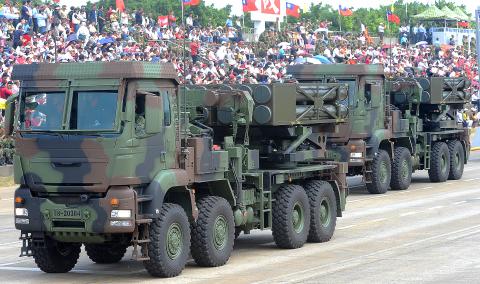Low spending on national defense as well as cuts in projected weapons acquisition, are signs that the armed forces are moving away from a combat-oriented to a relief-oriented military role and that detente in the Taiwan Strait is “unilateral,” critics of President Ma Ying-jeou’s (馬英九) administration have said.
During the presidential campaign in 2008, Ma vowed to bring spending on national defense to 3 percent of GDP, a pledge that he has not met in his four years in office. The proposed national defense budget for next year has been set at NT$314.15 billion (US$10.59 billion), lower than the NT$317.2 billion for this year.
China, meanwhile, has increased its military spending by double digits for most of the past decade, opposition lawmakers said, adding that this highlighted ignorance about the true nature of the Chinese threat on the part of the Ma administration.

Photo: Liu Hsin-de, Taipei Times
This year, China’s declared military budget will rise 11.2 percent to 670.27 billion yuan (US$106.41 billion), a figure that the Pentagon and military analysts argue does not reveal actual levels.
Beyond a failure to meet the target defense spending, appropriations for next year also indicate a shift away from combat readiness to operations other than war, predominantly relief operations, reflecting Ma’s 2009 announcement that natural catastrophes were now Taiwan’s “No. 1 enemy.”
The Chinese-language United Daily News reported on Sunday that initial plans by the army to procure 57 domestically produced Ray Ting-2000 (“Thunder 2000”) multiple rocket launchers for a total of NT$14.45 billion had been slashed by one-quarter in next year’s budget. According to the report, the Ministry of National Defense ordered in July last year that production be dropped to 43 launch vehicles, which are to be divided into three battalions. The budget for the acquisition has reportedly been cut to NT$13.22 billion.
Meanwhile, the ministry has set aside NT$860 million for eight new projects, of which more than half are to meet non-combat needs. Among the earmarked funds, NT$430 million has been set aside to purchase 73 excavators and loaders and NT$45 million to buy 128 rubber rafts.
The army said the purchases were to “strengthen disaster prevention and rescue capabilities and to expand the army’s capability to speedily repair roads and dredge waterways and reservoirs.”
Opposition lawmakers commenting on next year’s defense budget said appropriations failed to ensure the nation had the means to guarantee its defenses.
“The Ma administration has continually scaled back its military spending even though China’s threat to Taiwan has continued to rise over the past few years,” Democratic Progressive Party Legislator Hsiao Bi-khim (蕭美琴) was quoted as saying at the weekend.
Despite the relative calm in the Taiwan Strait since Ma’s election, Hsiao said the lack of reciprocity was impossible to ignore.
“The detente is just unilateral,” she said, pointing to the 1,600 ballistic and cruise missiles China has aimed at Taiwan — 200 more than last year, according to a report by the ministry on the People’s Liberation Army that was submitted to the legislature last week.
Additional reporting by AFP and Jake Chung

Taiwanese can file complaints with the Tourism Administration to report travel agencies if their activities caused termination of a person’s citizenship, Mainland Affairs Council Minister Chiu Chui-cheng (邱垂正) said yesterday, after a podcaster highlighted a case in which a person’s citizenship was canceled for receiving a single-use Chinese passport to enter Russia. The council is aware of incidents in which people who signed up through Chinese travel agencies for tours of Russia were told they could obtain Russian visas and fast-track border clearance, Chiu told reporters on the sidelines of an event in Taipei. However, the travel agencies actually applied

New measures aimed at making Taiwan more attractive to foreign professionals came into effect this month, the National Development Council said yesterday. Among the changes, international students at Taiwanese universities would be able to work in Taiwan without a work permit in the two years after they graduate, explainer materials provided by the council said. In addition, foreign nationals who graduated from one of the world’s top 200 universities within the past five years can also apply for a two-year open work permit. Previously, those graduates would have needed to apply for a work permit using point-based criteria or have a Taiwanese company

The Shilin District Prosecutors’ Office yesterday indicted two Taiwanese and issued a wanted notice for Pete Liu (劉作虎), founder of Shenzhen-based smartphone manufacturer OnePlus Technology Co (萬普拉斯科技), for allegedly contravening the Act Governing Relations Between the People of the Taiwan Area and the Mainland Area (臺灣地區與大陸地區人民關係條例) by poaching 70 engineers in Taiwan. Liu allegedly traveled to Taiwan at the end of 2014 and met with a Taiwanese man surnamed Lin (林) to discuss establishing a mobile software research and development (R&D) team in Taiwan, prosecutors said. Without approval from the government, Lin, following Liu’s instructions, recruited more than 70 software

BACK TO WINTER: A strong continental cold air mass would move south on Tuesday next week, bringing colder temperatures to northern and central Taiwan A tropical depression east of the Philippines could soon be upgraded to be the first tropical storm of this year, the Central Weather Administration (CWA) said yesterday, adding that the next cold air mass is forecast to arrive on Monday next week. CWA forecaster Cheng Jie-ren (鄭傑仁) said the first tropical depression of this year is over waters east of the Philippines, about 1,867km southeast of Oluanpi (鵝鑾鼻), and could strengthen into Tropical Storm Nokaen by early today. The system is moving slowly from northwest to north, and is expected to remain east of the Philippines with little chance of affecting Taiwan,